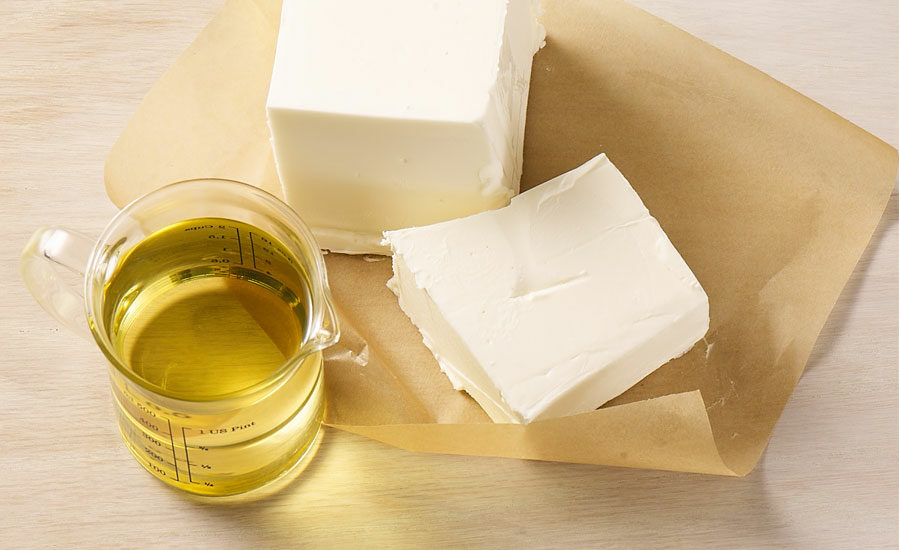Navigating supply chain challenges in the fats and oils market
Manufacturers look for healthier, sustainable, reliable supply for fats and oils.

Courtesy of Cargill

Courtesy of United Soybean Board


Fats and oils play an important role in delivering the sensory and quality attributes for snack and bakery products. Consumers’ interest in sustainability, health and wellbeing, and clean label are influencing the fats and oils category. Cargill conducts proprietary research to track consumers’ attitudes and trends regarding fats and oils (i.e. its Fatitudes study). Jamie Mavec, senior marketing manager, Global Edible Oils Solutions, Cargill shares key insights from the study.
“The study finds that more than half of consumers closely monitor fats and oils in packaged goods. Consumers tell us they’re paying attention to fats and oils because of health considerations like reducing their risk of heart disease or lowering their cholesterol. A majority of global consumers report the amount of fat (71 percent) and type of oil (69 percent) are important factors when determining which packaged foods to purchase. Olive oil had the strongest impact on purchase in every country included in our Fatitudes survey. Other higher scoring oils included avocado oil, fish oil, sunflower oils, and canola oil.”
New sustainable solutions
Cargill’s Fatitudes research showed U.S. consumers are more aware of sustainability claims. The research showed, “37% indicated they were more likely to purchase packaged food with a sustainability claim, a 6-point increase compared to 2019 results. For the first time, the survey also asked consumers what type of sustainability claims they were seeking. In the U.S., we found consumers were most likely to say they look for sustainably sourced (63%) or responsibly produced (57%) claims. Some other claims included conservation of natural resources (49%), fair trade (46%), and reduced packaging (39%),” shares Mavec.
Based on these insights the company is investing in regenerative agriculture program, supporting efforts to improve soil health and water management in row crops like sunflowers and expanding availability of Roundtable on Sustainable Palm Oil (RSPO)-certified segregated palm oil and adding RSPO segregated palm stearin and palm olein products to their North American portfolio. Palm olein can be used as a cooking oil, while palm stearin is used in formulations such as trans fat-free margarines and shortening.
“Segregated certified palm oil must be produced according to the principles and criteria established by the RSPO, which verifies that forests are protected, and social and environmental safeguards are met during the oil’s production and harvest. To carry the segregated-RSPO designation, all product must be kept separate from commodity palm oil supplies and be traceable throughout the supply chain. It is produced on RSPO- certified sustainable palm oil plantations, refined at RSPO-certified facilities and ultimately used by RSPO-certified manufacturer,” explains Dr. John Satumba, Ph.D., global bakery technical lead and regional R&D director for North America, Global Edible Oil Solutions, Cargill.
The company has also responded to customer requests for greater pliability across a wider temperature range for icing shortening and added new SKUs to its PalmAgility line to address this need.
Due to the influence of sustainability on consumer decisions, many organizations have begun pointing out the sustainability of their supply chain with label like the Sustainable U.S. Soy mark. This mark recognizes U.S. grown soy ingredients as sustainable ingredients for any food industry formulation and that there are benefits to farmers, consumers and processors alike, explains Richard Galloway, U.S. Soy Oils consultant.
New uses of existing fats & oils
Colorado Mills only produces expeller-pressed high-oleic sunflower oil in a hexane petroleum solvent-free facility. Traditionally high-oleic sunflower oil has been used for frying since it provides less absorption, lighter and crispier food, and extended fry life. Zac Kreider, Colorado Mills sees it as so much more, “ We see it as the everything oil. It’s perfect for baking. It is a great substitute for palm and soybean oil. A healthier fat and potentially less of it is a huge win for the customer. Our high oleic sunflower oil is finding its way into tortillas, breads, pretzels, plant-based proteins, margarines as well as chips and popcorn. These companies are seeing the value of performance, shelf life, and nutrition.”
While there has not been any new soy ingredients released this year, the soybean industry’s innovative products are designed to replicate the high functionality of partially hydrogenated ingredients. Galloway explains, “these products are well established, yet still underutilized by baking and snack industry professionals and include high oleic liquid oil for frying and cooking, interesterified shortenings for general purpose baked goods and high-oleic interesterified shortenings for specialty baking (icings and donut frying, etc.). Soy products can also be blended with other fats and oils to create a whole new product, unique to the needs of your formulation. They have been in the marketplace for several years as a drop-in substitute for partially hydrogenated oils (PHO’s), yet product formulators across the food industry are still finding applications for these ingredients.” For example, high oleic soybean oil and shortening can extend shelf life, increase stability, and provide a neutral flavor profile.
Improving the Fat Profile in Products
Benexia SA is a chia ingredient-focused company with over 20 years of experience. One of the company’s signature products is their Benexia Xia Oil, a cold pressed chia oil made from high quality chia seeds and extracted using proprietary technology developed by Benexia to preserve all the nutritional, functional and sensory properties of chia oil. Sandra Gillot, CEO, Benexia and Wendy Bazilian, DrPH., RDN, U.S. nutrition and health strategy consultant, Benexia, discuss the benefits of the product.
“Benexia Xia Oil contains a unique lipid profile composed of 10% saturated fats, 7% monounsaturated fats and 80% polyunsaturated fats, with 60% of omega-3 alpha linolenic acid (ALA) and 19% of omega-6 LA. It also contains a lot of high potency phytochemicals (like antioxidants). While the chia oil can be used alone, the lipid profile makes it ideal for blending it with other sources such as coconut, avocado, olive, and/or sunflower, which deliver the great nutritional value and maintain the finished products’ sensory characteristics.”
Benexia Xia Oil is very resistant to heat processing treatments; this chia oil has a smoke point of 410 degrees F making it very versatile due to its heat stability and the ability to preserve the high antioxidant and plant omega-3 levels.
Benexia Xia Oil has a clean, mild, light nutty flavor and also addresses consumer demand for clean label, plant-based, keto, better-for-you, and is a sustainable source for healthy fats. This product can be used in bars, crackers, chocolate snacks, breads, muffins and indulgent bakery applications.
Kreider notes that bakers and snack producers can improve the fat profile by considering oils that have higher monounsaturated fat levels and reducing the saturated fat levels. “High oleic sunflower oil has one of the highest levels of monounsaturated fat out of all the oils. Increased levels of monounsaturated fats will lower the saturated fat percentage. Different fats carry different levels of vitamin E, a natural antioxidant. High oleic sunflower oil runs higher levels than most oils and our proprietary process is producing vitamin E levels that are 2-3 times that of other sunflower oils. Shelf life has a lot to do with the fats that are in a packaged product. Our oleic acid levels and vitamin E levels help us achieve a shelf life that approaches two years.”
Jackie Steffey, senior customer innovation manager, AAK, notes a similar approach to improving the fat profile of products by using oils high in oleic acid as a replacement to hydrogenated fats. “High oleic oils improve the nutritional profile by providing a higher level of monounsaturated omega-9 fatty acids, reduced saturated fats, and no trans fats. High oleic oils also are less prone to oxidation which provides a longer shelf life; the higher levels of monounsaturated fats provide a higher heat tolerance for an extended fry life.” AAK supplies a variety of high oleic oils including high oleic sunflower oil and high oleic safflower oil under its AkoSun and AkoSaff product lines that can be used in snack applications.
The company also offers shortenings that are low in saturated fat under its EsSence line of shortenings. This line is based on canola oil and provides up to a 60% reduction in saturated fat compared to standard palm-based shortening.
Kemin has recently launched a new functional protein line, Proteus V, a plant-based protein that blocks fat and provides texture quality improvement for the fried snack category.
Lan Ban, director of R&D, Kemin describes this new product: “This new patent-pending product provides a film on the surface of food, helping to reduce the oil absorption/fat uptake and also improves the batter/breading adhesion. This is a benefit during production for oil quality and less batter/breading waste along the fry belt. There is no negative sensory impact and, in many cases, improves the crispiness of the snack foods.” This new ingredient is best suited for breaded or battered and fried items.
Approaches for handling supply chain challenges
Dr. Satumba said it best: “The resiliency of the supply chain and the ability to cost effectively access food is something that can easily be taken for granted. The supply chain disruptions have laid bare how robust—or how fragile—some supply chains truly were. Cargill maintains open lines of communication in helping their customers resolve supply chain issues. For example, flexible formulations and adjunctive labeling enable customers to change ingredients without compromising product characteristics. Current supply chain challenges may mean that customers need to switch between oils when formulating their snack and bakery options. Adjunctive labeling includes multiple options for oil ingredients to cover that contingency.” The company has also taken proactive measures to help mitigate supply chain disruptions and better navigate the supply chain challenges by investing in their supply chain and supply chain planning over the last several years.
Usage of soybean oil has been up across the board with a 7% rise in food industry usage from 2020 to 2021. Despite the challenges posed by the pandemic, supply chain issues, and reduced exports from Russia and Ukraine, “U.S. soybean farmers are sustainably producing more soybeans per acre to meet current demands—growing the second-highest crop yield on record in 2021. As supply chains continue to fluctuate with the world market, U.S. Soy remains well prepared to deliver enough food, fiber and fuel to meet this rising demand we anticipate in the future. In fact, twelve new U.S. soybean crushing plants have been announced or are under construction now. This represents a potential for up to 4.9 billion lbs. more of U.S. soybean oil productions by the end of 2025,” according to Galloway.
The supply of fats and oils have been greatly impacted by several global issues. “The United States relies heavily on imported oils. Canola, grapeseed, avocado, olive oil, palm, coconut, and sunflower oil purchasers all rely heavily on imports. A lot has changed with the fats and oils supply chain on a global scale since the pandemic started. Our industry felt the supply chain issues that everyone experienced. The industry had been running smoothly until the conflict with Ukraine and Russia started. The whole sunflower market was turned upside down as 80% of the world’s sunflower oil supply comes from these two countries. Colorado Mills proudly puts ‘Made in the USA’ on our package as we source every seed we crush from the United States,” explains Kreider. He suggests manufacturers have open communication, work with their suppliers, and plan well in advance to help navigate through these supply chain challenges.Looking for a reprint of this article?
From high-res PDFs to custom plaques, order your copy today!








